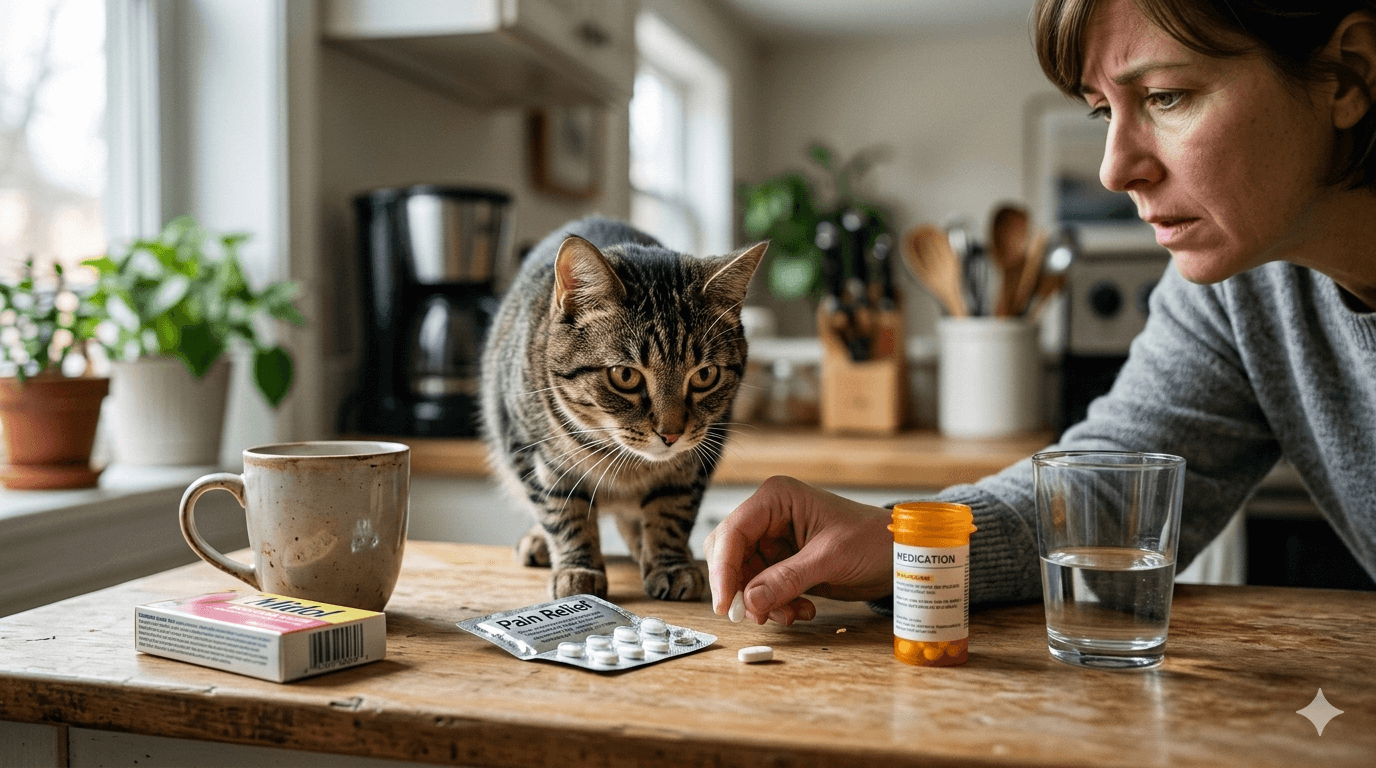Can You Give a Cat Ibuprofen? Everything You Need to Know
When your cat is in pain or discomfort, it’s natural to want to help them feel better as quickly as possible. However, when it comes to medications like ibuprofen, what’s safe for humans isn’t always safe for our feline friends. Ibuprofen, a common over-the-counter pain reliever for people, can be extremely dangerous—even lethal—for cats. Understanding why this medication is harmful and what alternatives exist is crucial for keeping your pet safe. In this guide, we’ll explore the risks of giving ibuprofen to cats, signs of toxicity, and safer ways to address your cat’s health concerns. Always prioritize consulting a veterinarian before administering any medication to your cat.
Why Is Ibuprofen Dangerous for Cats? Key Risks to Understand
Ibuprofen poses significant risks to cats due to their unique physiology and inability to metabolize certain substances. Here are some key reasons why this medication is so dangerous:
Kidney Damage : Ibuprofen can cause acute kidney failure by reducing blood flow to the kidneys and damaging their delicate tissues.
Gastrointestinal Ulcers : The medication irritates the stomach lining, leading to ulcers, vomiting, and internal bleeding.
Liver Toxicity : Cats’ livers lack the enzymes needed to break down ibuprofen, resulting in toxic buildup.
Central Nervous System Effects : High doses can lead to seizures, disorientation, or even coma in severe cases.
Even Small Doses Are Harmful : Cats are highly sensitive to ibuprofen, and even a single tablet can be life-threatening.
Understanding these risks highlights the importance of avoiding ibuprofen entirely and seeking veterinary advice for pain management or other health concerns.
Signs of Ibuprofen Poisoning in Cats
If you suspect your cat has ingested ibuprofen, recognizing the symptoms early can save their life. Here are some common signs of ibuprofen toxicity:
Vomiting (May Contain Blood) : One of the earliest and most noticeable symptoms of gastrointestinal irritation.
Lethargy or Weakness : Your cat may appear unusually tired or uninterested in activities they normally enjoy.
Loss of Appetite : Refusal to eat is a red flag that something is wrong internally.
Increased Thirst and Urination : These signs often indicate kidney involvement or damage.
Difficulty Breathing : Labored breathing can occur if the central nervous system is affected or if there’s internal bleeding.
If you notice any of these symptoms, contact your veterinarian immediately, as prompt treatment is critical for recovery.
Check this guide 👉Gastritis in Cats: Best 7 Expert Tips!
Check this guide 👉Hyperesthesia in Cats: Best 7 Health Tips!
Check this guide 👉Tachypnea in Cats: Best 7 Health Tips!

Safe Practices for Cat Health | Unsafe Practices to Avoid |
|---|---|
Consult a vet before giving any medication | Administer human medications like ibuprofen |
Use species-specific pain relief prescribed by a vet | Assume small doses of human drugs are safe |
Keep medications stored securely out of reach | Leave medications on countertops or tables |
Monitor your cat for unusual behavior or symptoms | Ignore signs of illness or poisoning |
Provide fresh water to support kidney health | Force your cat to take medications without vet approval |
What to Do If Your Cat Ingests Ibuprofen
If you discover that your cat has accidentally consumed ibuprofen, quick action is essential. Here’s what you should do:
Contact Your Veterinarian Immediately : Time is critical, so call your vet or an emergency animal clinic right away.
Do Not Induce Vomiting Without Guidance : Attempting to make your cat vomit without professional advice can worsen the situation.
Provide Details About the Exposure : Inform your vet about the amount ingested, the time it occurred, and any symptoms you’ve observed.
Transport Your Cat to the Clinic : Follow your vet’s instructions and bring your cat in for evaluation and treatment.
Avoid Home Remedies : Do not try to treat ibuprofen poisoning at home, as improper intervention can cause further harm.
Acting swiftly and responsibly ensures your cat receives the care they need to recover safely.
Safer Alternatives to Ibuprofen for Cats
If your cat is experiencing pain or inflammation, there are safer options available under veterinary supervision. Here are some alternatives to consider:
Prescription Pain Medications : Vets may prescribe species-specific drugs like meloxicam or buprenorphine for pain relief.
Anti-Inflammatory Treatments : Non-steroidal anti-inflammatory drugs (NSAIDs) designed for cats can be used under strict veterinary guidance.
Natural Supplements : Options like omega-3 fatty acids or glucosamine may help reduce inflammation in certain conditions.
Hydration Therapy : Ensuring your cat stays hydrated supports overall health and aids in recovery from minor ailments.
Behavioral Modifications : Providing soft bedding, gentle massage, or environmental adjustments can alleviate discomfort without medication.
Always consult your veterinarian before starting any new treatment to ensure it’s appropriate for your cat’s specific needs.
Protecting Your Cat from Dangerous Substances
Many household items, including medications like ibuprofen, can pose serious risks to your cat’s health. Being aware of these hazards allows you to create a safer environment for your pet.
Over-the-Counter Medications : Drugs like acetaminophen (Tylenol) and aspirin are also toxic to cats and should never be administered without veterinary guidance.
Household Cleaners : Bleach, detergents, and other cleaning products can irritate your cat’s skin or cause poisoning if ingested.
Plants : Certain plants, such as lilies and poinsettias, are highly toxic to cats and should be kept out of reach.
Human Foods : Items like chocolate, onions, garlic, and caffeine can harm your cat’s digestive and nervous systems.
Essential Oils : While popular for aromatherapy, oils like tea tree or eucalyptus can be dangerous if inhaled or ingested by cats.
By identifying and securing these common hazards, you can prevent accidental exposure and keep your cat safe from harm.
Proactive Steps to Keep Your Cat Safe
Preventing accidental poisoning starts with awareness and responsible pet ownership. Here are some practical tips to minimize risks in your home:
Store Medications Securely : Keep all medications, including ibuprofen, in locked cabinets or high shelves where your cat cannot access them.
Use Pet-Safe Cleaning Products : Opt for non-toxic cleaners specifically labeled as safe for pets.
Supervise Curious Cats : Monitor your cat’s behavior to ensure they aren’t chewing on cords, plants, or other hazardous items.
Educate Family Members : Ensure everyone in your household understands the dangers of giving human medications or foods to cats.
Create a Safe Space : Designate an area free of potential toxins where your cat can relax and play without risk.
Taking these precautions helps reduce the likelihood of accidental poisoning and ensures a safer home environment for your feline friend.
Recognizing Early Warning Signs of Poisoning
Cats are naturally curious, and their tendency to explore can sometimes lead to accidental ingestion of harmful substances. Recognizing the signs of toxicity early can make a significant difference in their recovery.
Excessive Drooling : Often a sign of oral irritation or nausea caused by ingesting something toxic.
Difficulty Breathing : Labored or rapid breathing may indicate respiratory distress due to poisoning.
Unusual Behavior : Restlessness, agitation, or lethargy can signal that your cat has been exposed to a harmful substance.
Pale Gums : A sign of internal issues, such as blood loss or organ damage, requiring immediate attention.
Seizures or Tremors : These severe symptoms often occur with advanced toxicity and necessitate emergency care.
If you notice any of these signs, act quickly and contact your veterinarian to determine the best course of action.
Frequently Asked Questions About Giving Ibuprofen to Cats
Can I give my cat a very small dose of ibuprofen?
No, even tiny amounts can be toxic to cats due to their sensitivity to the drug.
What should I do if my cat accidentally eats ibuprofen?
Contact your veterinarian immediately for guidance on how to proceed.
Are there any human medications safe for cats?
Contact your veterinarian immediately for guidance on how to proceed.
How long does it take for ibuprofen toxicity symptoms to appear?
Symptoms can begin within hours, depending on the dose ingested and your cat’s size.
Can ibuprofen poisoning be treated successfully?
With immediate veterinary intervention, many cases can be managed, but outcomes depend on the severity of exposure.
Prioritize Your Cat’s Safety and Health
While it’s tempting to reach for familiar remedies like ibuprofen when your cat is unwell, doing so can have devastating consequences. Cats require specialized care tailored to their unique biology, and only a qualified veterinarian can provide safe and effective treatments. By understanding the dangers of ibuprofen and knowing what steps to take in an emergency, you can protect your furry companion from harm. Remember, prevention and education are key—store medications securely, monitor your cat’s behavior closely, and always seek professional advice when in doubt. With love and vigilance, you can ensure your cat enjoys a long, healthy, and happy life.
Can I Give My Cat Midol? Best 7 Expert Tips! – Learn the risks, symptoms, and safe alternatives to keep your cat healthy and avoid toxic reactions.
Can I Give My Dog Midol? Best 7 Expert Tips! – Discover the risks, safe alternatives, and expert advice to keep your dog safe from accidental poisoning.
Maximum Weight for Cats on Planes: Best 7 Expert Tips! – Learn airline policies, tips to stay compliant, and ensure safe travels for your feline friend.
Max Weight for Dogs on Planes: Best 7 Expert Tips! – Discover airline weight limits, safe travel tips, and solutions for flying with your dog stress-free.





